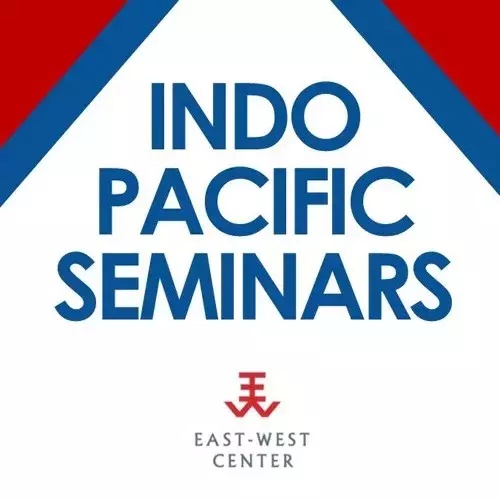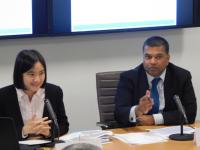Error message

OFFICE/DEPARTMENT
The US’ Indo-Pacific Strategy and Its Impacts on the Future Development of Asian Economic Architectures
An Asia Pacific Foreign Policy and Defense Seminar featuring:
Dr. Kaewkamol (Karen) Pitakdumrongkit
Asia Studies Visiting Fellow
East-West Center in Washington
Dr. Satu Limaye (Moderator)
Director, East-West Center in Washington
This research examined the US’ Indo-Pacific strategy and its impacts on the future development of Asian economic governance. Dr. Pitakdumrongkit’s project is aimed at:

(1) assessing how Indo-Pacific and Asia-Pacific policies would interact to alter the future advancement of Asian economic architectures; and (2) coining policy recommendations for the US and Asian governments on what they should do to lessen clashes among their different agendas and strategies, which in turn could help reduce the likelihood of competing regional economic initiatives in the future. Hence, the questions she plans to explore include: “What are the details of America’s Indo-Pacific strategy?”, “How will this strategy be received by Asian nations?”, “How will Indo-Pacific and Asia-Pacific policies interact to shape the future advancement of Asian economic architectures?”, and “What should American and Asian governments do to prevent or lessen conflicts among their different policies and strategies?”
Thursday, May 17
12:00 P.M. – 1:30 PM EST
This seminar was off-the-record.
For more images, please visit the album for this event on the East-West Center's Flickr page.
Dr. Kaewkamol (Karen) Pitakdumrongkit is a Deputy Head and Assistant Professor at the Centre for Multilateralism Studies at S. Rajaratnam School of International Studies (RSIS) of Nanyang Technological University, Singapore. She completed her MA and PhD in Political Science at the University of California, Santa Barbara. Her research interests include international economic negotiation, Southeast Asian and East Asian economic governance (focusing on trade, money and finance), regional-global economic governance dynamics, ASEAN Economic Community, and cooperation between ASEAN and dialogue partners (ASEAN-Plus frameworks). She has published in various outlets such as The Singapore Economic Review, The International Relations of the Asia-Pacific, The Pacific Review, Australian Outlook, Eurasia Review, and East Asia Forum. Her media interviews include Bangkok Post, Bloomberg, Business Times, Channel News Asia, CNBC Asia-Pacific, New Straits Times, The Strait Times, and Xinhua. Besides publications and media engagement, Dr. Karen has organized several capacity-building programs such as the Annual RSIS-World Trade Organization (WTO) Parliamentarian Workshops in Singapore and In-Country Workshops on Technical Trade Issues which are tailored to the specific needs of the trade officials in countries such as Laos, Malaysia, Thailand, and Vietnam. She was also part of the team involved in composing the elements of the ASEAN Economic Community Blueprint 2025. In addition, Dr. Karen teaches courses on International Economics for International Political Economy, and the Political Economy of Southeast Asia at the RSIS International Political Economy program and occasionally provides the Overseas Study Visit Briefings to the military students at Singapore’s Goh Keng Swee Command and Staff College.
Dr. Satu Limaye is Director of the East West Center in Washington and the creator of the Asia Matters for America/America Matters for Asia initiative. He is also Senior Advisor, CNA Corporation. Earlier, Dr. Limaye served on the research staff of the Strategy, Forces & Resources Division at the Institute for Defense Analyses (IDA) and Director of Research & Publications at the Asia Pacific Center for Security Studies. His recent publications include: Weighted West, Focused on the Indian Ocean and Cooperating Across the Indo-Pacific: India's New Maritime Strategy, Capabilities and Diplomacy (CNA, 2017); "Integrating an Ally and an Aligner in a 'Principled Security Network': The U.S. and the India-Japan Strategic Partnership" in Rajesh Basrur and Sumithi Narayanan Kutty (eds.) The India-Japan Strategic Partnership, Springer: 2018; "ASEAN is Neither the Problem Nor Solution to South China Sea Disputes," in Gilbert Rozman and Joseph Chinyong Liow, International Relations and Asia's Southern Tier, 2017; "From Peak to Plateau in U.S.-ASEAN Relations," in Mari Elka Pangestu and Rastam Mohd Isa (eds.), ASEAN Future Forward, 2017. Dr. Limaye also writes the annual analysis of India-East Asia and US-India relations for the Pacific Forum CSIS journal Comparative Connections. He is a magna cum laude and Phi Beta Kappa graduate of Georgetown University and received his doctorate from Oxford University (Magdalen College) where he was a George C. Marshall Scholar.
The US’ Indo-Pacific Strategy and Its Impacts on the Future Development of Asian Economic Architectures
An Asia Pacific Foreign Policy and Defense Seminar featuring:
Dr. Kaewkamol (Karen) Pitakdumrongkit
Asia Studies Visiting Fellow
East-West Center in Washington
Dr. Satu Limaye (Moderator)
Director, East-West Center in Washington
This research examined the US’ Indo-Pacific strategy and its impacts on the future development of Asian economic governance. Dr. Pitakdumrongkit’s project is aimed at:

(1) assessing how Indo-Pacific and Asia-Pacific policies would interact to alter the future advancement of Asian economic architectures; and (2) coining policy recommendations for the US and Asian governments on what they should do to lessen clashes among their different agendas and strategies, which in turn could help reduce the likelihood of competing regional economic initiatives in the future. Hence, the questions she plans to explore include: “What are the details of America’s Indo-Pacific strategy?”, “How will this strategy be received by Asian nations?”, “How will Indo-Pacific and Asia-Pacific policies interact to shape the future advancement of Asian economic architectures?”, and “What should American and Asian governments do to prevent or lessen conflicts among their different policies and strategies?”
Thursday, May 17
12:00 P.M. – 1:30 PM EST
This seminar was off-the-record.
For more images, please visit the album for this event on the East-West Center's Flickr page.
Dr. Kaewkamol (Karen) Pitakdumrongkit is a Deputy Head and Assistant Professor at the Centre for Multilateralism Studies at S. Rajaratnam School of International Studies (RSIS) of Nanyang Technological University, Singapore. She completed her MA and PhD in Political Science at the University of California, Santa Barbara. Her research interests include international economic negotiation, Southeast Asian and East Asian economic governance (focusing on trade, money and finance), regional-global economic governance dynamics, ASEAN Economic Community, and cooperation between ASEAN and dialogue partners (ASEAN-Plus frameworks). She has published in various outlets such as The Singapore Economic Review, The International Relations of the Asia-Pacific, The Pacific Review, Australian Outlook, Eurasia Review, and East Asia Forum. Her media interviews include Bangkok Post, Bloomberg, Business Times, Channel News Asia, CNBC Asia-Pacific, New Straits Times, The Strait Times, and Xinhua. Besides publications and media engagement, Dr. Karen has organized several capacity-building programs such as the Annual RSIS-World Trade Organization (WTO) Parliamentarian Workshops in Singapore and In-Country Workshops on Technical Trade Issues which are tailored to the specific needs of the trade officials in countries such as Laos, Malaysia, Thailand, and Vietnam. She was also part of the team involved in composing the elements of the ASEAN Economic Community Blueprint 2025. In addition, Dr. Karen teaches courses on International Economics for International Political Economy, and the Political Economy of Southeast Asia at the RSIS International Political Economy program and occasionally provides the Overseas Study Visit Briefings to the military students at Singapore’s Goh Keng Swee Command and Staff College.
Dr. Satu Limaye is Director of the East West Center in Washington and the creator of the Asia Matters for America/America Matters for Asia initiative. He is also Senior Advisor, CNA Corporation. Earlier, Dr. Limaye served on the research staff of the Strategy, Forces & Resources Division at the Institute for Defense Analyses (IDA) and Director of Research & Publications at the Asia Pacific Center for Security Studies. His recent publications include: Weighted West, Focused on the Indian Ocean and Cooperating Across the Indo-Pacific: India's New Maritime Strategy, Capabilities and Diplomacy (CNA, 2017); "Integrating an Ally and an Aligner in a 'Principled Security Network': The U.S. and the India-Japan Strategic Partnership" in Rajesh Basrur and Sumithi Narayanan Kutty (eds.) The India-Japan Strategic Partnership, Springer: 2018; "ASEAN is Neither the Problem Nor Solution to South China Sea Disputes," in Gilbert Rozman and Joseph Chinyong Liow, International Relations and Asia's Southern Tier, 2017; "From Peak to Plateau in U.S.-ASEAN Relations," in Mari Elka Pangestu and Rastam Mohd Isa (eds.), ASEAN Future Forward, 2017. Dr. Limaye also writes the annual analysis of India-East Asia and US-India relations for the Pacific Forum CSIS journal Comparative Connections. He is a magna cum laude and Phi Beta Kappa graduate of Georgetown University and received his doctorate from Oxford University (Magdalen College) where he was a George C. Marshall Scholar.









